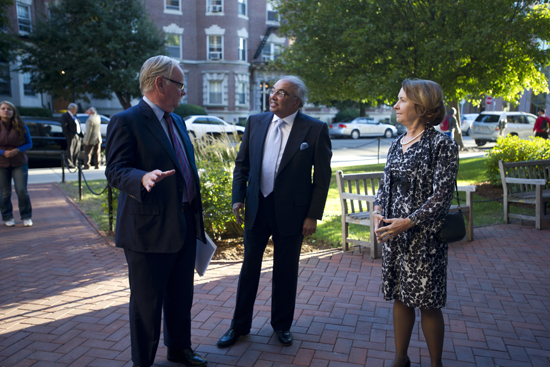Rajen Kilachand arrived at Boston University the night of September 18, 2013, jet-lagged but jovial, to celebrate the completion of renovations to the building named in honor of his parents. The summer face-lift of Kilachand Hall was made possible thanks to the BU alum and trustee’s generous $10 million gift last fall.
“This hall is the physical manifestation of the vision to create the college,” said President Robert A. Brown, referring to the Arvind and Chandan Nandlal Kilachand Honors College, which Kilachand (GSM’74) endowed with a $25 million gift in 2011. Like the hall, the college is named for his parents. “We believe the hall will greatly enhance the learning community created within this building.”
Kilachand told the group that he is “constantly overrun by the praise and appreciation of the BU family.” In preparing his words for the event, he said, he realized the reception carried great significance in Hindu philosophy. For the following two weeks, the lunar period known as Pitru Paksha, Hindu families would spend time remembering, praying for, and dedicating all they do to their ancestors, he said. Kilachand’s gifts to the University in the name of his parents, including the endowment of a professorship, help him pay homage. “This particular occasion today has a lot of meaning,” he said.
The residence hall at 91 Bay State Road, formerly Shelton Hall, underwent extensive first-floor renovations. A combination of wood, cork, cobalt, and blue glass was installed to give the space a “very simple, architecturally modernist look,” according to Charles Dellheim, director of the Kilachand Honors College and the University’s first Arvind and Chandan Nandlal Kilachand Professor.

President Robert A. Brown (from left), Kilachand, and Beverly Brown, development director of the Center for Global Health & Development and the president’s wife, outside Kilachand Hall.
Built in 1923, Kilachand Hall was originally the Sheraton Hotel, the forerunner of the Sheraton hotel chain. The building has a storied history. Baseball sluggers Babe Ruth and Ted Williams caroused there and Nobel-winning playwright Eugene O’Neill lived on the fourth floor (now dubbed the Writers’ Corridor) for a year, dying there in 1953. BU bought the building in 1954, by then the Shelton Hotel, and it became Shelton Hall. It provided living space for 420 women students and later was coed. It was renamed Kilachand Hall last year, although the word “Sheraton” is still engraved above the doorway.
Dellheim joked that the Kilachand Honors College’s new residence hall never was the Taj Mahal architecturally. But he said it has good bones and it reflects the college’s overall philosophy of finding new ways to look at traditional ideas.

The Arvind and Chandan Nandlal Kilachand Honors College offices are on the first floor of Kilachand Hall.
“This particular gift really allows us to be a living and learning community with all the advantages of a residential college,” said Dellheim, who is a College of Arts & Sciences professor of history. “Students get to know each other and faculty on a daily and informal basis that otherwise wouldn’t be possible. The gift also helps strengthen our identity and presence on campus.”
Surrounded by the gleaming surfaces and clean lines of the new lobby, Dellheim thanked Brown and Kilachand for their unwavering support. “Without your vision, constant resolve, and energy,” he said, “we would not be standing here today.”















































Related Stories
Rajen Kilachand (GSM’74) to Accept Honorary Doctorate
Philanthropist and BU trustee, endowed Kilachand Honors College
Carrie Preston to Lead Kilachand Honors College
English scholar plans greater interaction between BU and the city
BU Names Kilachand Honors College Associate Directors
Linda Doerrer, Paul Lipton lend scientific thought to “visionary” curriculum
Post Your Comment